Discover folk - the CRM for people-powered businesses
Social selling isn't just a buzzword: it's the future of sales.
| Main points |
|---|
|
Why social selling matters now
In a world where cold calls are ignored and inboxes are flooded, social selling allows you to connect with potential customers on platforms they already use, building trust and relationships instead of pushing products.
In this guide, we'll break down what social selling is, the best platforms to use, top strategies to boost your efforts, and the most effective tools for mastering this approach.
Ready to transform how your sales team of 20-50 people can sell more effectively in 2025?
👉🏼 Try folk now to manage contact-based reminders with your team
What is Social Selling?
Social selling is the practice of using social media to find, connect with, understand, and nurture sales prospects. It's not about cold pitching. It's about building authentic relationships that convert over time.
Instead of relying on outdated tactics like cold calls or mass email blasts, social selling happens on platforms where your prospects already spend time—primarily:
- X (formerly Twitter)
- Sometimes Facebook or TikTok, depending on your audience
What Does Social Selling Help You Do?
✅ Build trust through consistent, helpful interactions
✅ Position yourself (and your brand) as a subject-matter expert
✅ Warm up leads before the first sales touchpoint
✅ Accelerate deal velocity
✅ Generate more qualified inbound leads
And the numbers back it up: 78% of social sellers outsell peers who don't use social media.
Top Social Selling Channels
LinkedIn Social Selling
LinkedIn is by far the best platform for B2B outreach, networking, and content marketing. It allows businesses to build authority and trust by sharing insightful content and engaging with professionals.
Pros
- Tailored for B2B
- Advanced filters and Sales Navigator
- Long-form content works well
Cons
- Time-consuming to do right
- Competitive space
Best practices
- Send personalized DMs
- Comment consistently on ICP's posts
- Use content to spark conversation (not sell)
Twitter (X)
Twitter is a powerful platform for thought leadership, industry news, and real-time engagement. Its fast-paced nature allows for quick interactions and joining trending conversations.
Pros
- Fast and easy to join trending conversations
- Ideal for sharing bite-sized value
- Good for prospect research with hashtags and lists
Cons
- Short content lifespan
- Harder to track conversions
Best practices
- Follow and engage with your ICP
- Use advanced search to identify leads
- Share insights, not just links
Instagram thrives as a visual storytelling tool, great for branding and lifestyle connections. It's perfect for businesses focused on aesthetic appeal, emotions, and casual interactions.
Pros
- Strong for lifestyle or product-based businesses
- Great for building emotional connections
- Instagram Stories and DMs allow casual interactions
Cons
- Harder for B2B lead gen
- Not ideal for complex products
Best practice
- Use Stories polls and Q&A for engagement
- Share client results or team culture
- Link your content in bio or Stories
Best Social Selling Strategies
Best social media strategies are all about building trust before the pitch. In 2025, success comes from showing up consistently, adding value, and staying human. For medium-sized sales teams managing multiple prospects simultaneously, you don't need to sell hard—you need to connect smart with the right CRM system to track every interaction.
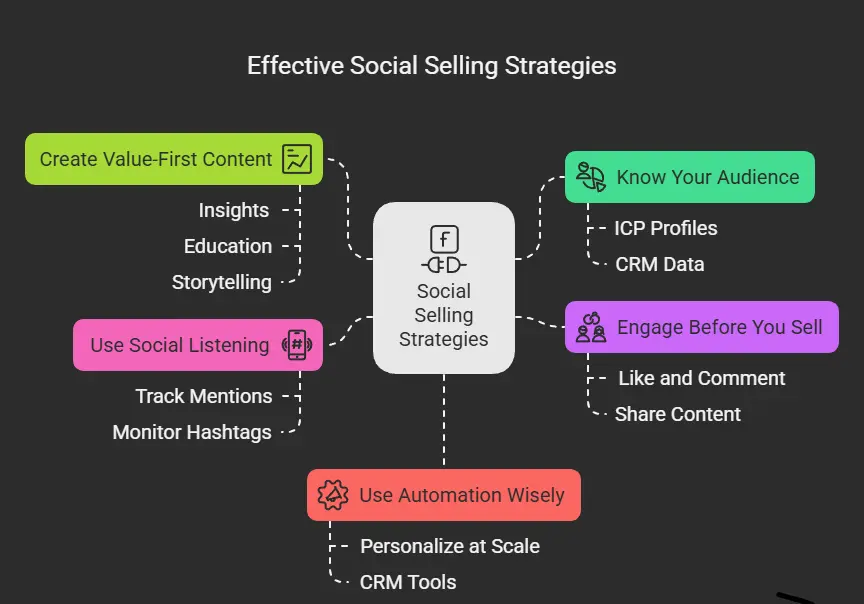
- Know your audience.Build detailed ICP profiles using CRM data. This enables you to refine your messaging and approach to exactly who you want to target.
- Engage before you sell.Don't rush to pitch! Like, comment, share valuable content, and show genuine interest in your prospects. Be present in their world before selling.
- Create value-first content.Focus on insights, education, and storytelling. Content that adds value and solves problems for your audience is what gets attention.
- Use social listening.Track conversations around your niche and engage when you find the right moment. Use tools to monitor mentions, hashtags, and keywords.
- Use automation wisely.Automation can help scale social selling efforts, but it should always feel personal. Don't over-automate—personalize at scale using CRM tools that allow automation without losing the human touch, especially when managing a team of 20-50 sales professionals.
10 Best Social Selling Tools
Discover the 10 best social selling software and tools compared.
Social Selling Tools Comparison
| Tool | Best For | Pros | Cons | Price |
|---|---|---|---|---|
| folk CRM | Lead Management, Social Selling, Relationship management | Simple UI, smart automation, CRM | Essential features only | From $20/mo |
| LinkedIn Sales Navigator | Prospecting on LinkedIn | Great filters, insights | Expensive, steep learning curve | From $99/mo |
| Hootsuite | Social scheduling | Multi-platform, analytics | UI can feel outdated | From $99/mo |
| Sprout Social | Social engagement | Full suite, team-friendly | Pricey | From $249/mo |
| Zoho CRM | CRM + social | Customizable, integrated tools | Clunky UI | From $20/mo |
| HubSpot | Sales + CRM | Free tier, lots of features | Can get expensive fast | From $0 |
| Buffer | Post scheduling | Clean UI, easy to use | Limited analytics | From $6/mo |
| Nimble | Social CRM | Relationship insights | Limited integrations | From $24.90/mo |
| Sendible | Agencies | White labeling, client dashboards | UI less modern | From $29/mo |
| Crystal | LinkedIn personality analysis | Unique psych profiles | Niche use case | From $49/mo |
1. folk CRM
Best for
Relationship management and outreach automation. folk CRM is the perfect solution for teams of 20-50 people doing social selling, offering intuitive CRM functionality with powerful social integrations across Instagram, LinkedIn, Twitter (X), and WhatsApp.
✔️ Pros
- Easy-to-use interface with minimal setup, perfect for medium-sized sales teams.
- Automates follow-ups while maintaining a personal touch across all social platforms.
- Social integrations for all major platforms (LinkedIn, Twitter, Instagram, WhatsApp).
- Centralized contact management and communication history for teams of 20-50 professionals.
- Scales perfectly for growing sales teams without enterprise complexity.
❌ Cons
- Focuses on essential features rather than advanced enterprise tools
Pricing
Starts at $20/month per user, making it cost-effective for teams of 20-50 people.
👉🏼 Try folk now to never miss a follow-up when engaging prospects on LinkedIn and X
2. LinkedIn Sales Navigator
Best for
In-depth LinkedIn prospecting, lead management, and sales automation.

✔️ Pros
- Advanced search filters for precise lead targeting.
- Provides real-time updates on lead activities.
- Integration with CRM tools for seamless workflow.
❌ Cons
- Learning curve for new users.
- Expensive, especially for small businesses.
Pricing
Starts at $99/month.
3. Hootsuite
Best for
Social media scheduling and monitoring.
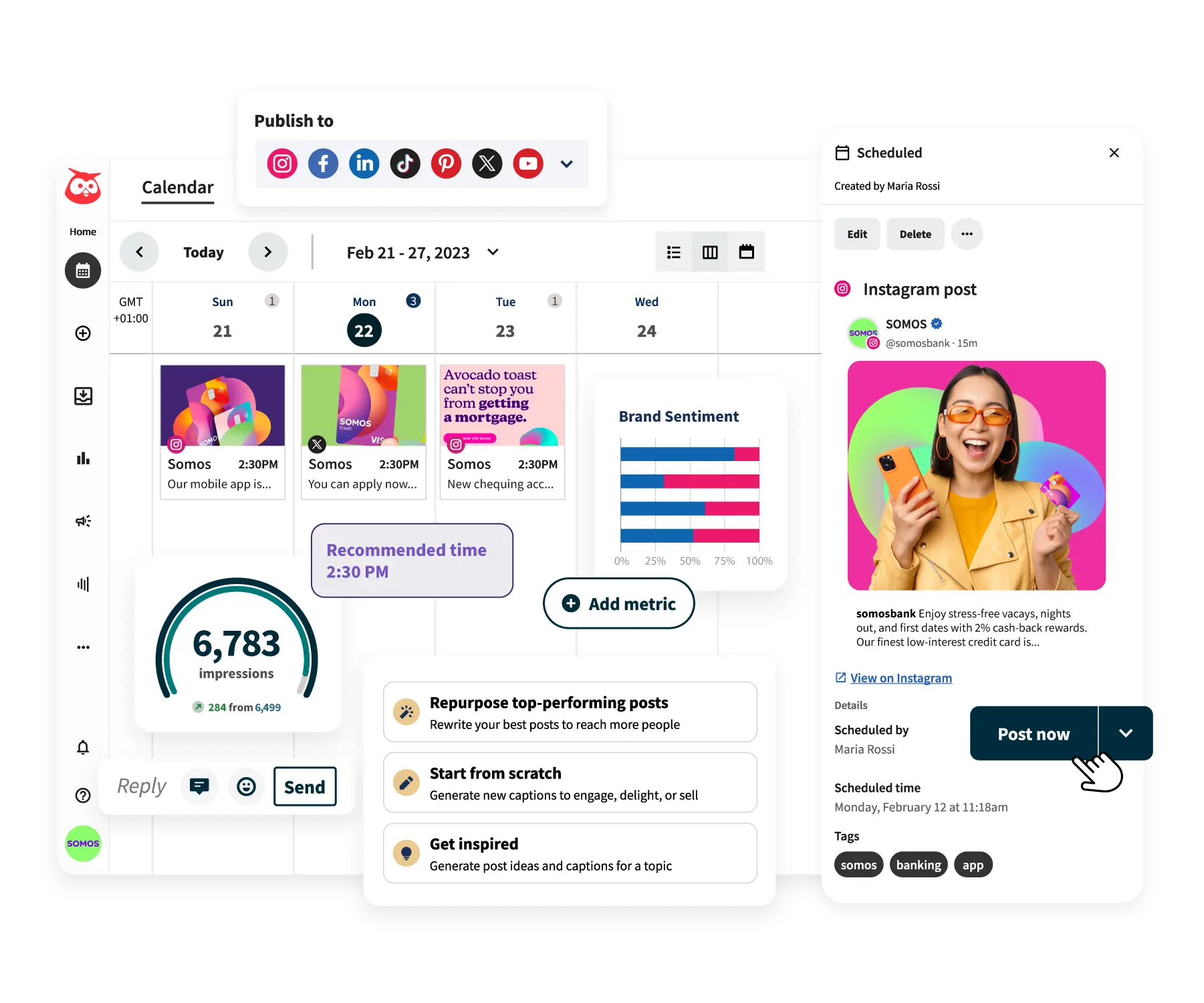
✔️ Pros
- Supports all major social platforms.
- Powerful analytics and monitoring tools.
- Ideal for managing multiple accounts.
❌ Cons
- Interface can feel outdated.
- Limited CRM functionalities.
Pricing: Starts at $99/month.
4. Sprout Social
Best for
Teams needing advanced social engagement features.
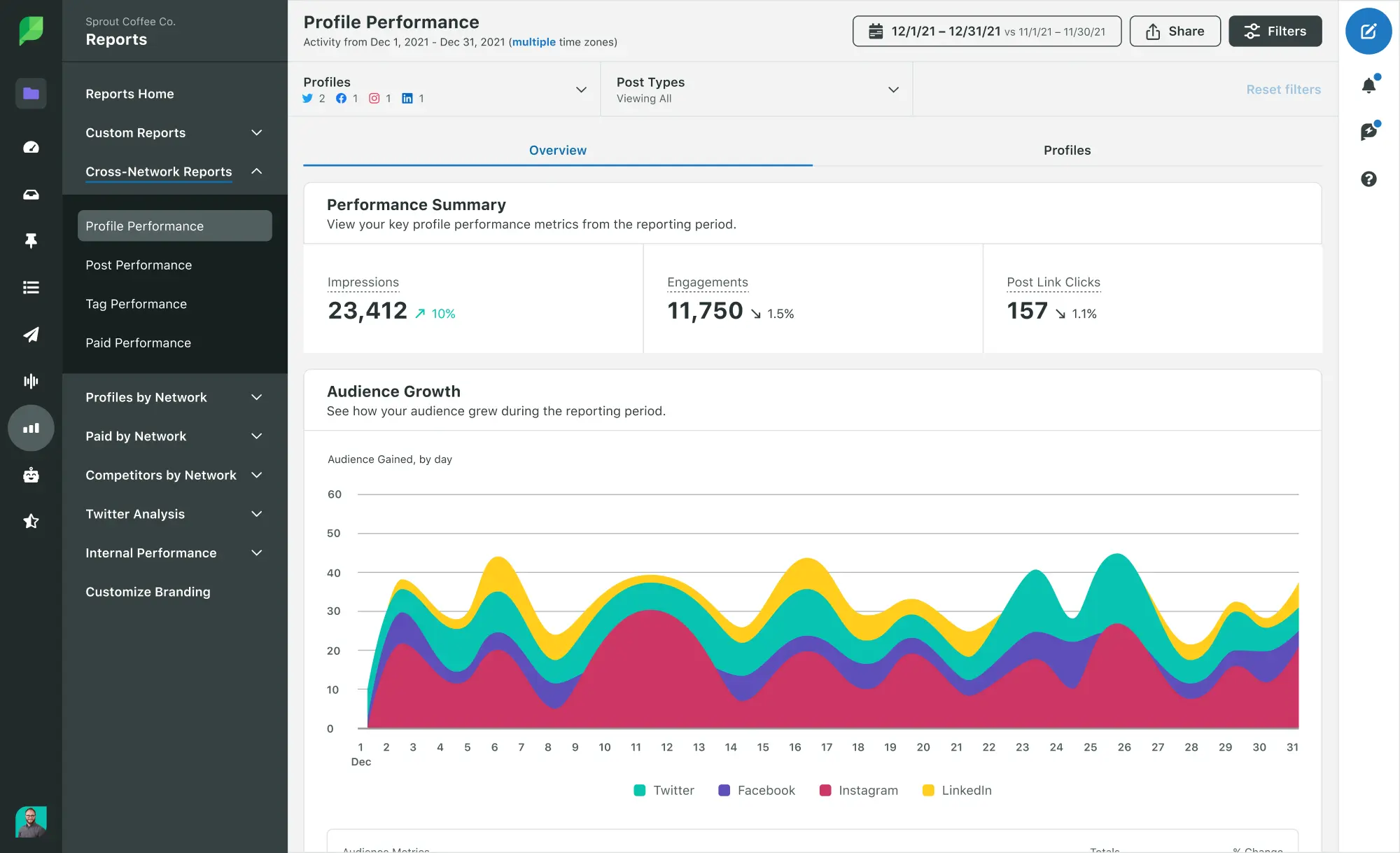
✔️ Pros
- Complete social media management suite.
- Excellent team collaboration features.
- Detailed analytics and reporting tools.
❌ Cons
- Pricing may be prohibitive for solopreneurs or small teams.
Pricing
Starts at $249/month.
5. Zoho CRM
Best for
CRM combined with social media integrations.

✔️ Pros
- Affordable pricing with extensive customization options.
- Integrates social media platforms like Twitter and Facebook.
- Custom workflows and lead management.
❌ Cons
- User interface feels clunky and outdated.
Pricing
Starts at $20/month.
6. HubSpot
Best for
Sales automation and CRM with inbound marketing capabilities.

✔️ Pros
- Generous free plan with essential features.
- Excellent customer support and learning resources.
- Easy-to-use interface.
❌ Cons
- Costs can escalate quickly as you scale.
- Limited social media integrations compared to other tools.
Pricing
Free plan available, paid plans from $18/month.
7. Buffer
Best for
Scheduling and publishing posts across multiple social channels.
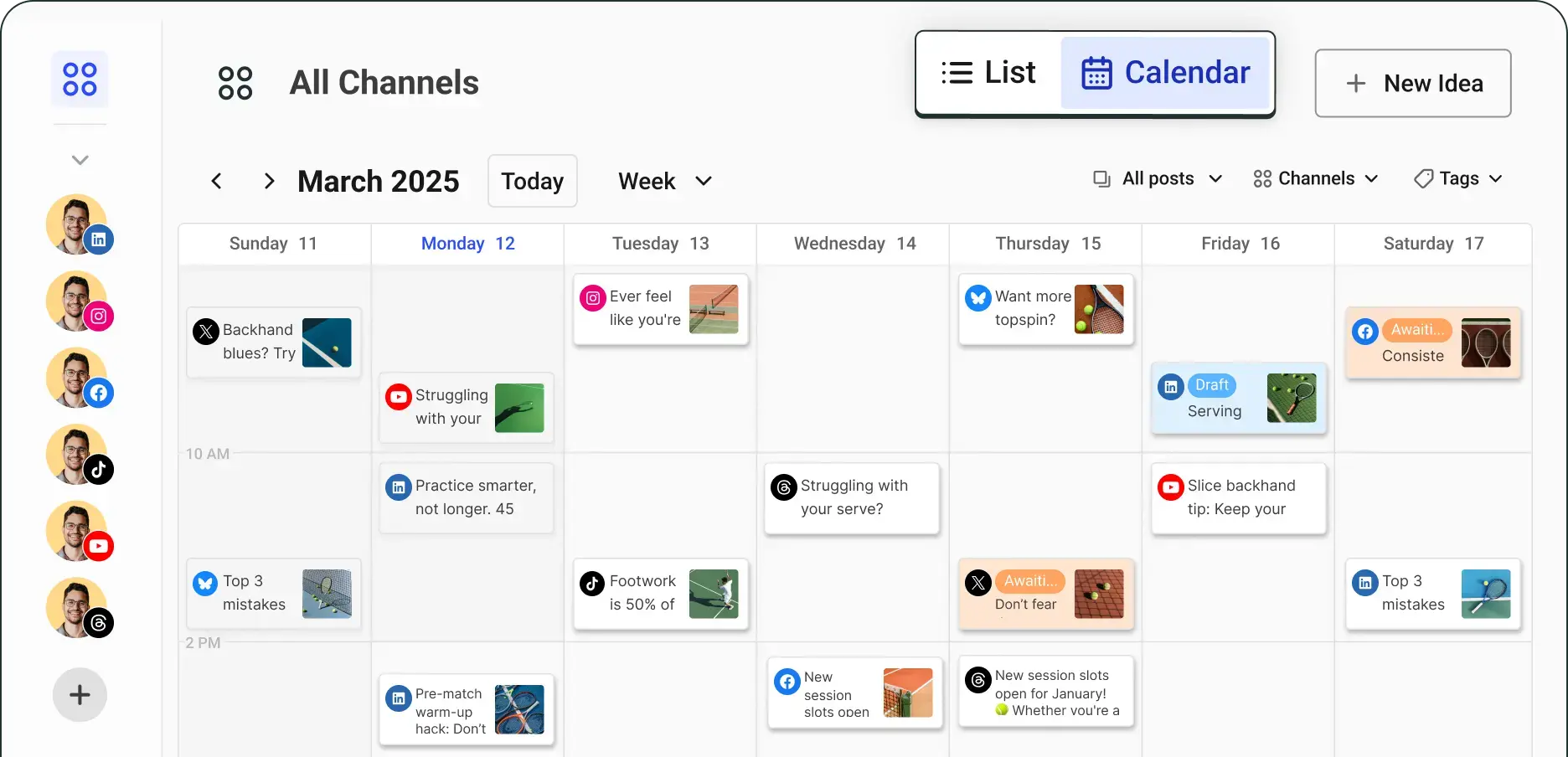
✔️ Pros
- Clean and simple user interface.
- Low-cost, making it suitable for startups and solopreneurs.
- Works well with Instagram, Twitter, and LinkedIn.
❌ Cons
- Limited analytics and reporting tools.
Pricing
Starts at $6/month.
8. Nimble
Best for
Relationship building and social insights.
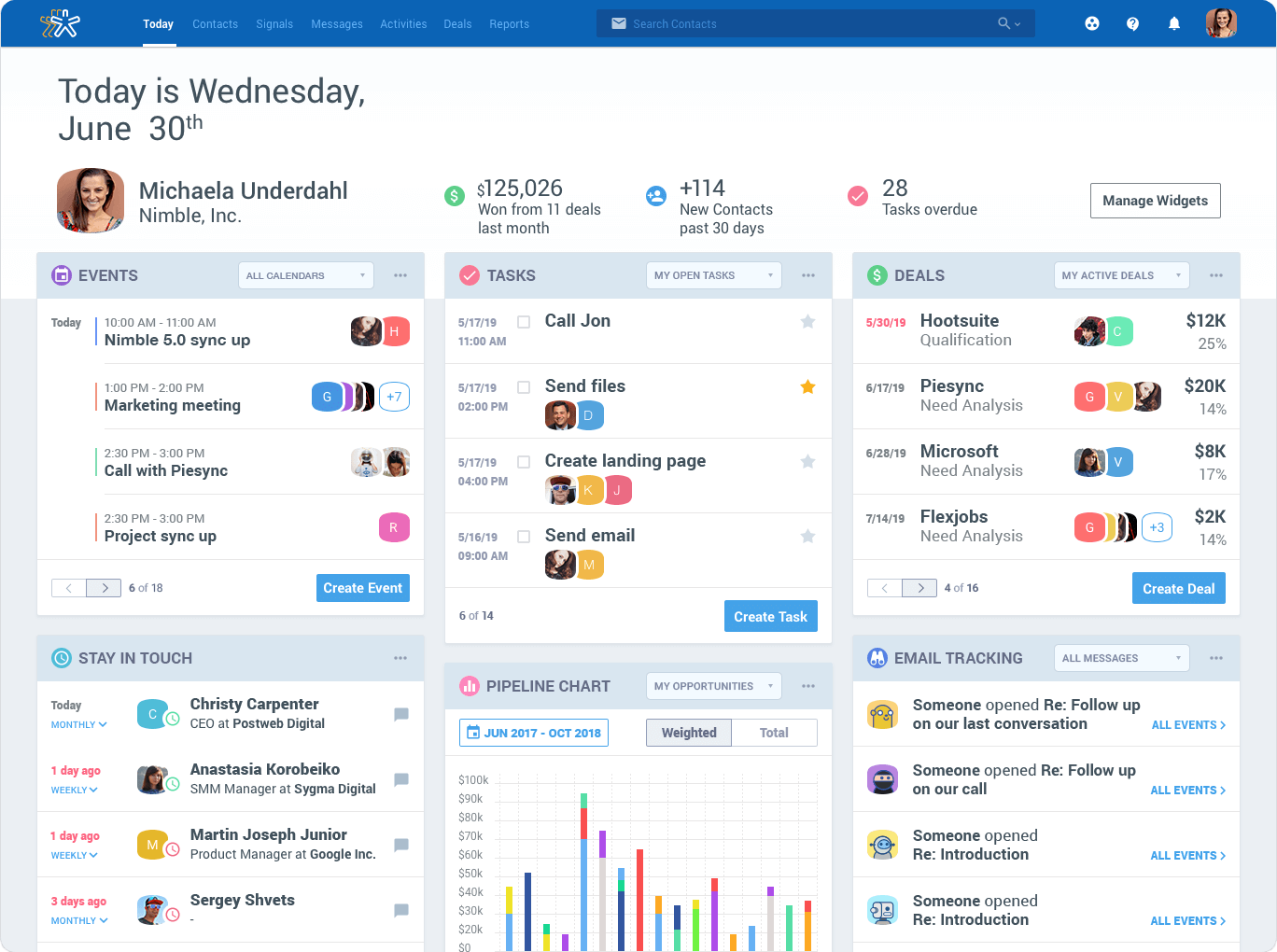
✔️ Pros
- Tracks social conversations and provides actionable insights.
- Integrates well with LinkedIn and other social platforms.
- Built for small businesses and solopreneurs.
❌ Cons
- Limited integrations outside of social networks.
Pricing
Starts at $24.90/month.
9. Sendible
Best for
Agencies that manage multiple clients' social media profiles.
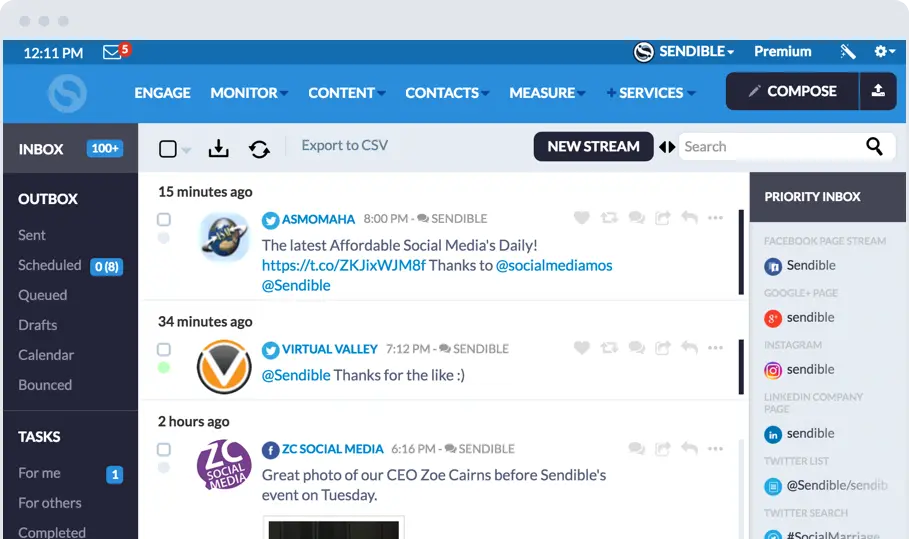
✔️ Pros
- White-labeling and client reporting features.
- Multi-platform support, including Instagram, Twitter, LinkedIn, etc.
- Great for managing teams.
❌ Cons
- Interface feels a bit outdated.
Pricing
Starts at $29/month.
10. Crystal
Best for
Analyzing personality traits and tailoring messaging.
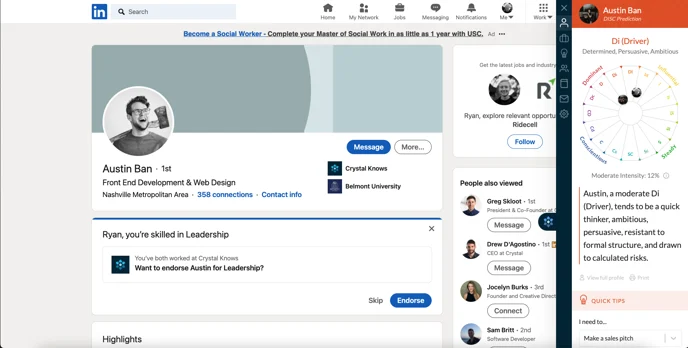
✔️ Pros
- Unique ability to analyze LinkedIn profiles and offer communication tips based on personality types.
- Helps craft more personalized messages for social selling.
❌ Cons
- Limited to LinkedIn only.
- Niche use case.
Pricing
Starts at $49/month.
Social Selling Stats in 2025
- 78% of social sellers outsell peers who don't use social media. Source
- 76% of buyers are ready to have a conversation on social media. Source
- Companies with consistent social selling processes are 40% more likely to hit revenue goals. Source
- LinkedIn is the #1 platform for B2B lead generation. Source
Ready to supercharge your team's social selling efforts? For sales teams of 20-50 people looking for the perfect balance of functionality and simplicity, folk CRM delivers everything you need to manage social selling at scale without the complexity of enterprise tools. Try folk today.
FAQ
What is outreach in social media?
Social media outreach is proactive engagement with prospects via comments, DMs, mentions, and shares to start relevant conversations, build trust, and move leads toward a sales dialogue without cold pitching.
How do you start with social selling?
Define ICPs, follow targets, engage before pitching, share useful content, use social listening, personalize DMs, and log every touchpoint in a CRM. Consistency wins; aim to add value in each interaction.
Which platforms work best for social selling?
LinkedIn for B2B prospecting and content, X (Twitter) for real-time conversations and research, Instagram for visual storytelling and brand affinity. Choose where your buyers are most active.
What tools help with social selling?
Use a CRM to track contacts and messages, social listening for mentions/keywords, and schedulers for posts. A lightweight option like folk centralizes outreach and automates follow-ups.
Discover folk CRM
Like the sales assistant your team never had


